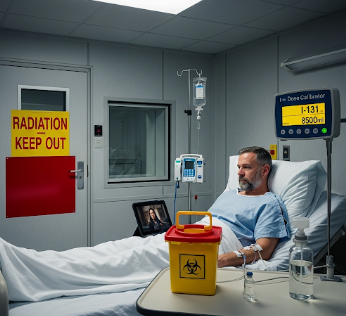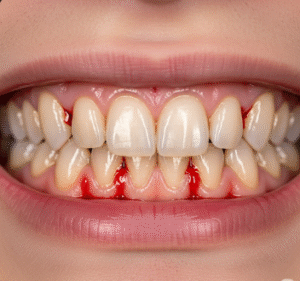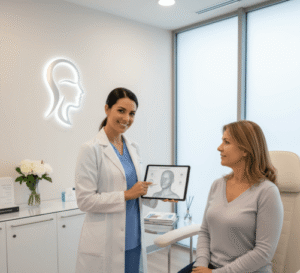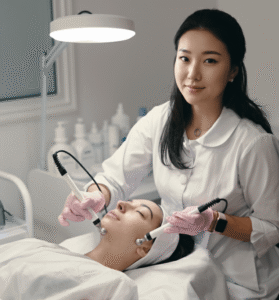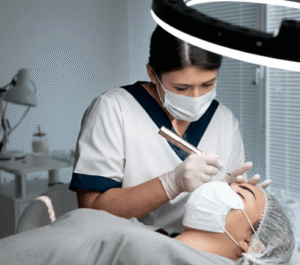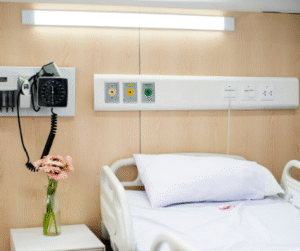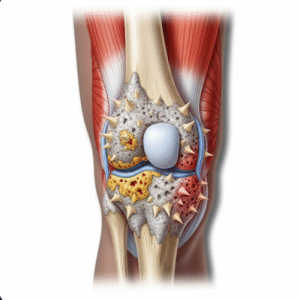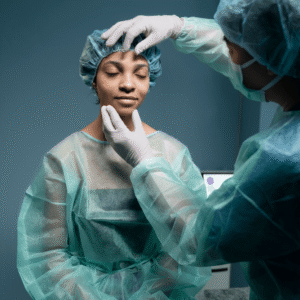Overview
Radioactive iodine therapy (RAI) is a medical treatment used primarily for thyroid conditions, including hyperthyroidism (overactive thyroid) and thyroid cancer. The therapy uses radioactive iodine-131, which selectively accumulates in thyroid tissue, delivering targeted radiation that destroys overactive or residual thyroid cells.
South Korea is renowned for advanced nuclear medicine facilities, experienced endocrinologists, and precise treatment protocols, ensuring RAI is both safe and highly effective.
What is Radioactive Iodine Therapy?
RAI involves oral administration of iodine-131, a radioactive isotope that is naturally absorbed by thyroid cells. Key points include:
✔ Selective targeting: Iodine-131 accumulates mainly in thyroid tissue.
➔ Non-invasive therapy: Administered orally as a capsule or liquid.
● Used for both hyperthyroidism and thyroid cancer.
★ Effective for destroying residual thyroid tissue or metastases.
This therapy is recommended for patients with Graves’ disease, toxic nodules, or as follow-up treatment after thyroidectomy for thyroid cancer.
What are the Benefits?
RAI therapy provides several advantages:
✔ Non-surgical treatment option for overactive thyroid.
➔ Reduces or eliminates the need for long-term anti-thyroid medication.
● Targets residual thyroid tissue after surgery for thyroid cancer patients.
★ High success rate for controlling hyperthyroidism and preventing cancer recurrence.
➤ Outpatient procedure with minimal discomfort.
Procedure Details
1) How should I prepare for Radioactive Iodine Therapy?
Preparation ensures safety and treatment effectiveness:
✔ Thyroid function assessment: Blood tests for TSH, T3, and T4.
➔ Medication review: Discontinue certain thyroid medications as instructed.
● Dietary preparation: Low-iodine diet for 1–2 weeks prior to therapy.
★ Pregnancy and breastfeeding check: Therapy contraindicated in pregnant or lactating women.
➤ Patient counseling: Understand isolation precautions, possible side effects, and post-therapy follow-up.
2) What happens during the Radioactive Iodine Therapy?
RAI is administered in a controlled medical setting:
✔ Oral administration: Iodine-131 given as a capsule or liquid.
➔ Absorption: Radioactive iodine accumulates in thyroid tissue over hours.
● Radiation precautions: Patient may be monitored briefly to ensure safety.
★ Outpatient process: Typically performed in a specialized nuclear medicine unit; most patients go home the same day.
➤ Duration: Administration is quick (minutes), but radioactive effects continue over several days.
Korean nuclear medicine specialists ensure safe handling, accurate dosing, and patient education for optimal outcomes.
3) What happens after Radioactive Iodine Therapy?
Post-treatment care focuses on radiation safety, monitoring, and thyroid management:
✔ Isolation precautions: Avoid close contact with others, especially children and pregnant women, for several days.
➔ Hydration: Drink plenty of fluids to help eliminate residual radioactivity.
● Monitoring: Blood tests at intervals to check thyroid hormone levels and treatment response.
★ Possible side effects: Mild neck pain, temporary taste changes, or dry mouth.
➤ Follow-up imaging or scans: Used in thyroid cancer patients to evaluate residual tissue or metastasis.
Risks / Benefits
Possible Risks:
✔ Temporary neck tenderness or swelling
➔ Mild nausea or taste changes
● Dry mouth or salivary gland inflammation
★ Hypothyroidism requiring lifelong thyroid hormone replacement
➤ Rare allergic reaction to iodine preparation
Major Benefits:
✔ Non-invasive treatment for hyperthyroidism and thyroid cancer
➔ Reduces or eliminates need for surgery in certain cases
● Targets residual thyroid tissue or metastatic disease precisely
★ High success rate and effective long-term disease control
➤ Outpatient procedure with minimal discomfort
Recovery and Outlook
✔ Immediate recovery: Most patients return home the same day.
➔ Radiation precautions: Follow safety guidelines for a few days to a week.
● Thyroid function monitoring: Regular blood tests to track hormone levels.
★ Long-term outcome: High rates of disease control; may require thyroid hormone replacement therapy.
➤ Follow-up: Lifelong monitoring for thyroid cancer patients; routine follow-up for hyperthyroidism patients.
When To Call the Doctor
Contact your doctor immediately if you notice:
✔ Severe neck pain or swelling
➔ Persistent nausea or vomiting
● Signs of infection (fever, chills)
★ Unusual fatigue, palpitations, or symptoms of thyroid imbalance
➤ Unexpected allergic reaction or severe dry mouth
Best Korea Option / Process
South Korea provides expert radioactive iodine therapy services with:
✔ Leading hospitals: Asan Medical Center, Samsung Medical Center, Seoul National University Hospital Nuclear Medicine.
➔ Experienced endocrinologists and nuclear medicine specialists ensuring precise dosing and safety.
● Comprehensive care: Pre-therapy preparation, treatment administration, and post-therapy follow-up.
★ Patient-centered approach: Education on diet, isolation, and radiation safety.
➤ Medical tourism support: Translation, appointment coordination, and continuity of care for international patients.
✅ Highlights:
✔ RAI targets thyroid tissue for hyperthyroidism and thyroid cancer
➔ Non-invasive, outpatient therapy with minimal discomfort
● Reduces need for surgery or long-term medication
★ Risks include hypothyroidism, mild neck tenderness, and salivary gland effects
➤ Korean hospitals provide expert nuclear medicine teams and comprehensive pre/post-care

